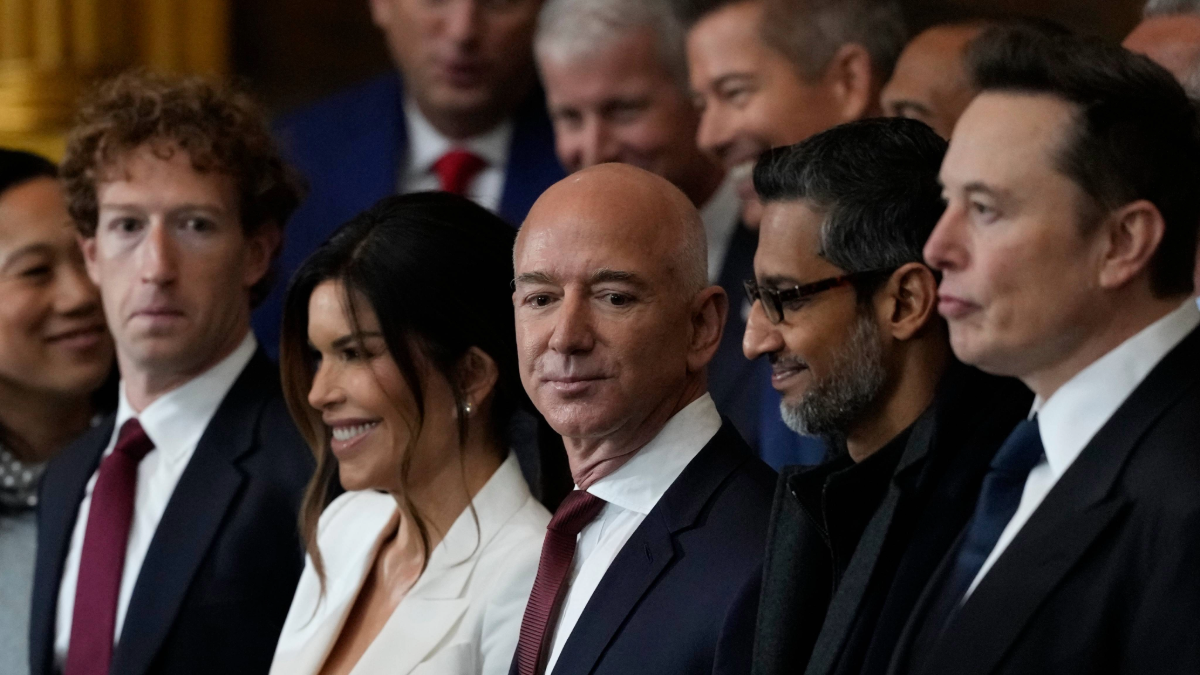Tech Oligarchy Imperils Democratic Information Flows
Jamie Hancock / Jun 9, 2025This post is part of a series of contributor perspectives and analyses called "The Coming Age of Tech Trillionaires and the Challenge to Democracy." Learn more about the call for contributions here, and read other pieces in the series as they are published here.

WASHINGTON, DC - JANUARY 20, 2025: Guests including Mark Zuckerberg, Lauren Sanchez, Jeff Bezos, Sundar Pichai, and Elon Musk attend the Presidential Inauguration of Donald J. Trump in the US Capitol Rotunda. (Photo by Julia Demaree Nikhinson - Pool/Getty Images)
Today’s tech billionaires are capable of disrupting the information supply chains that underpin democracies worldwide.
With their extreme wealth, control over information infrastructures, and proximity to political power, the billionaire owners of Big Tech companies can shape the information ecosystems that democracies depend on to make decisions. In a recent Demos report, we examined the risks facing the UK’s information supply chains. This article draws on the report to explore how the tech oligarchy systematically exerts power over democracies’ information ecosystems and what democracies can do to push back. With several tech billionaires expected to become trillionaires within a decade, we must attend to this issue now.
Mass digitization led to the mass centralization of power
For decades, centralized control over key information infrastructures has accrued to leading tech companies and their billionaire owners, putting these organizations and individuals in a position to make unilateral decisions about how information flows in democracies worldwide.
Whilst the spread of digital technologies has decentralized information production and dissemination, it has also centralized power over digital infrastructure in undemocratic ways. It is helpful to think about this concentration in terms of the `tech stack’: the layers of technology on which digital services depend.
Consider what happens when you send a message on your phone. When you tap send, your message is transmitted from your phone via electromagnetic signals that flow between towers, satellites, seabed cables, and data-center servers en route to your recipient. Because private firms own nearly every link in this infrastructure, they have become indispensable to the functioning of contemporary society and have accumulated a historic amount of power.
As a result, Big Tech’s billionaire owners can wield global political influence in ways that may undermine democratic processes. This is the tech oligarchy.
Unilateral decision-making about information flows
Tech companies make unilateral decisions about how information flows in the networks they own. When they do, they shape the information available to citizens and officials, influencing their views and choices. This means that tech companies may affect democratic discourses and systems profoundly. In some cases, companies’ decisions appear to have been made directly by their owners and may have been made with political motives.
Meta’s content moderation policies provide a useful illustration. In early 2025, Meta announced major changes to its rules on acceptable speech on its platforms, including alterations to Meta’s ‘hateful conduct policy’. Meta founder and CEO Mark Zuckerberg said the decision was a response to the “cultural tipping point” of the re-election of US President Donald Trump. Leaked documents suggested the new rules would allow users to post discriminatory language about immigrants, LGBTQ+ people, and other minority communities. Meta also announced it was ending its third-party fact-checking program in the US and introducing a Community Notes-based moderation system similar to X. These policy changes demonstrate how platform owners can shape the information available on their services according to their own political agendas. It illustrates how global platforms can make decisions to address political developments in one country – primarily the US – that affect the rest of the world’s information supplies.
Meanwhile, with the emergence of generative AI, Big Tech companies and their owners have acquired further control over the tools that people use for self-expression. Leading AI developers like OpenAI and Google have been subject to controversy over decisions regarding what their models will or will not generate. For example, OpenAI announced in February that it had reworked its products to ensure they no longer “avoid or censor topics.” Like Meta’s changes to its content moderation policies, some have speculated that these changes were a response to Trump’s re-election.
But the tech oligarchy's power over information flows goes deeper than content on platforms they control. The same individuals and companies hold sway over critical infrastructure throughout the tech stack. Decisions about lower-level infrastructure can determine whether communities and even governments have access to services.
Take Elon Musk’s satellite internet service, Starlink. In 2023, Musk said the Ukrainian government had made “an emergency request from government authorities to activate Starlink all the way to Sevastopol” to provide internet access to Ukrainian civilians and the Ukrainian army. Musk claims he declined the request to avoid allowing Ukraine to “sink most of the Russian fleet” and make Starlink “complicit in a major act of war.” This incident points to a profound problem: the power to cut off internet access in a democratic country defending against an invasion rests with an unelected private citizen and their individual judgment.
Political influence through messaging, funding, and insider access
Beyond the platforms and services they own, tech billionaires’ extraordinary wealth and status gives them an outsized ability to influence democratic processes in pursuit of their interests. When they involve themselves in the politics of countries beyond the ones they call home, this activity can amount to foreign interference.
For example, Musk has attempted to influence politics in several countries. These incidents are alarming, even if you put aside Musk’s activities as a ‘special government employee’ in the second Trump administration. In the UK, Musk amplified false and misleading claims about the Southport riots in July and August 2024, such as falsified news headlines about government “detainment camps” for rioters, and claimed the country was becoming a “tyrannical police state.” He accused the Prime Minister Keir Starmer, former Prime Minister Gordon Brown, and Cabinet ministers of being “complicit” in offenses by paedophiles in the UK’s ‘grooming gangs scandal.’ Besides his public antics, Musk allegedly explored donating $100 million to the UK’s right-wing Reform party, before falling out with Reform’s leader, Nigel Farage. Meanwhile, in Brazil, Musk refused to comply with an order from Brazil’s Supreme Court that X must suspend accounts accused of spreading disinformation about Brazil’s elections. In response, Brazil blocked the site, leading Musk to lambast the Supreme Court judge who ordered the ban. Brazil persevered and, ultimately, Musk backed down. X paid a $5 million fine, removed the accounts, and restored service.
Similarly, Amazon founder Jeff Bezos’ decisions since purchasing The Washington Post illustrate how a decline in traditional media revenue has created an opening for tech billionaires to exert political influence. In recent months, Bezos interfered in the Post’s editorial process by blocking an endorsement of Kamala Harris’s US Presidential candidacy and changed its editorial policy to focus the opinion section on promoting “personal liberties and free markets."
Musk and Bezos are not alone: there are indications that tech oligarchs have tried to influence electorates through less public channels. The tech venture capitalists Marc Andreessen and Ben Horowitz donated $49.8 million to pro-cryptocurrency and Republican causes during the US election. Peter Thiel, co-founder of PayPal and Palantir, has a history of providing financial backing to right-wing causes and mentored US Vice President JD Vance.
Dark money and billionaire influence in politics are not new. Yet the tech oligarchy’s unprecedented wealth, prestige, and access to politicians allows its members to stage political influence campaigns at previously unthinkable scales.
Enabled by insufficient regulatory frameworks and enforcement
Gaps in regulatory frameworks and enforcement have enabled this situation. In particular, the US’s application of its anti-monopoly legislation in the technology sector was lax from the 1990s until the Biden administration, enabling the emergence of a handful of dominant Big Tech firms. Several of these are controlled directly or indirectly by billionaire founders. While there has been an uptick in the amount of anti-monopoly action undertaken by the US government, illustrated by cases brought by federal regulators against Google and Meta, it is hard to predict how far the second Trump administration will continue on this path.
Meanwhile, regulation in other countries may be lacking when it comes to limiting the disproportionate influence tech billionaires wield compared to the general public. Consider the UK’s example. In 2024, the UK passed the Online Safety Act (OSA) to regulate online platforms and reduce digital harms. Yet the OSA lacks a systematic response to the role platforms and their owners play in facilitating the spread of unreliable information. Its key provision on false and misleading information is to make sending messages containing information the sender knows to be false with the intent of causing “harm to a likely audience” a criminal offence. However, enforcement challenges – such as proving intent and jurisdictional limits – will render it largely ineffective against widespread misinformation or foreign influence. Furthermore, the OSA primarily targets specific content that harms individuals. It lacks a systematic response to the role platforms and their owners play in facilitating the spread of unreliable information.
The UK also has the National Security Act 2023, which criminalizes foreign interference on behalf of a foreign power. Yet influential figures like Elon Musk, who engage in online political discourse from abroad, likely fall outside its scope.
As a result of their limitations, laws like these are unlikely to be effective in helping to mitigate the systemic risk posed by tech oligarchy to information ecosystems.
What can be done?
The risk the tech oligarchy poses to democratic information supply chains is systemic rather than individual. Cases like Musk’s and Zuckerberg’s illustrate how long-term problems with market concentration, regulatory enforcement, and other issues have given a small handful of people the opportunity to influence the information available to ordinary people across the entire technology stack. The power the tech oligarchy can wield over information flows and democratic politics threatens the processes on which democracies depend.
But all is not lost. At Demos, we have set out policy options to help address the problem. They include reviewing foreign ownership of media rules to incorporate transparency requirements for social media companies, providing more support for news media, and establishing requirements for social media platforms to mitigate the negative impacts of unreliable information spreading online.
Beyond policy, actions taken by ordinary people and governments alike have shown how resistance is possible. Movements like the Tesla Takedown protests have demonstrated that tech billionaires remain vulnerable to public pressure, especially if it threatens their stock valuations. Likewise, as in Brazil’s case, some governments have pushed back on pressure campaigns and asserted their sovereignty.
While the tech oligarchy’s historic accumulation of wealth and power may pose a risk to democratic processes, there is still an opportunity to change course and build more resilient democracies.
Authors
